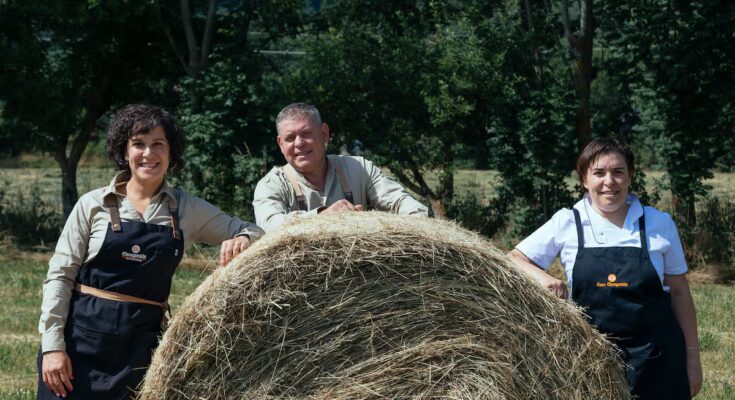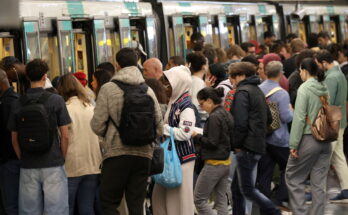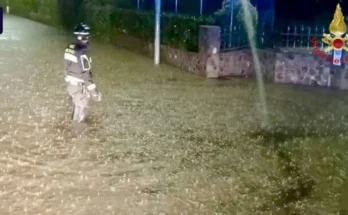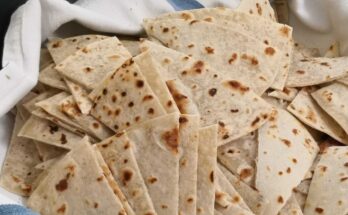Behind the stone facade there is the history of this family which has been rebuilt around the restaurant. Long-time ranchers, when regulations established a ban on keeping farm animals within the urban area, rethought what to do with the livestock barn and haystack. It was his father, Juan Martín Ballarín, who had the first idea. According to his daughters, he spent two days sitting on the porch counting the cars that passed on the street right in front of his house, until he was convinced that enough cars were passing by to open a restaurant and be able to make a living. With this certainty in mind, he contacted an architect to capture his idea and present it to the family. Even if they didn’t see it clearly at first, time would eventually prove them right.
It took a few years for Begoña Martín, the eldest of the daughters, to decide to take a step forward and leave her job in an office in Huesca to dedicate herself to cooking. It was the first element of a domino effect that ended up placing her siblings, Judith and Juanjo, in the living room of the house. None had prior training, but they had a generous dose of enthusiasm. In the early years Begoña enlisted the help of her mother, who was her main support in the kitchen. “My mother cooked very well, so I joined her,” he recalls. Little by little, he experimented with new techniques and nuances to give a different look to the traditional ingredients and recipes of the Benasque Valley. Judith, for her part, hastened to develop a wine list focused on local references, many of which belong to the Somontano DO, which complement the dishes of the cuisine.
Juanjo Martín has decided to follow the family tradition and take care of the livestock which, as long as the cold allows it, graze freely in the surrounding mountains. Almost a hundred brown mountain cows and limousines that require daily attention and in-depth knowledge of the area. “There are almost no farmers left and the children of those who will retire don’t want to continue with the profession,” he comments with some concern. He also regrets the lack of support from the city council when it comes to creating water wells: “It’s not that there is no water, it’s that they don’t want to deal with building them. We farmers had to organize ourselves to do it,” he adds. Juanjo combines agricultural work with restaurant work, running the restaurant together with his sister.
Despite the difficulties, the Martín family has managed to create a successful business, which attracted the attention of the Michelin guide, which awarded it the Bib Gourmand recognition in 2013, and which promotes good food at affordable prices.
Many wonder what such a particular name means. “Here in the mountains all the houses have names and ours is called Chongastán. We suppose it comes from the Juan Castán conjunction, but it’s not clear where it comes from,” says Begoña Martín. Whatever its origin, the house has become a welcoming restaurant, with that rustic charm given by wood and stone, so characteristic of mountain areas, where you can enjoy stews such as pig’s trotters or recado, a typical stew that mixes potatoes, chickpeas, rancid oil and vegetables from their garden which can be seen from the windows of the dining room. Those who prefer fish can also treat themselves to trout from the Cinca river, served in a sashimi version (18 euros), grilled octopus with truffle puree or cod with homemade tomato sauce (23 euros). But without a doubt it is the different cuts and different preparations of the calves raised that attract visitors to the area. Succulent beef meatballs with mashed potatoes and mushrooms (18 euros), steaks (60 euros per kilo) and loins (25 euros) cooked on the grill, cannelloni or stewed tripe for the more raw (19 euros). The offer is so wide that it is impossible to fail.
Such careful work in caring for the animals also led them to close the circle and cover all the steps in the meat supply chain. Eight years ago they decided to open a small butcher’s shop called El Rebost, the pantry pathsthe local language—, right in the nearby place. Another family member, this time a politician, takes care of her. Here you can buy sausages, steaks and matacía prepared as in the past: blood sausages, chorizos, tortetas (donuts made with blood and anise) or sausages that are shipped daily.
Here everything happens with different rhythms, marked by the seasons and the life of the valley. Farming, the vegetable garden, the kitchen and the butcher’s shop are part of the same family mechanism, a way of understanding work that does not separate the field from the plate. More than a restaurant, Casa Chongastán is the way in which a family has been able to adapt their profession to new times without giving up their roots. Cooking as it has always been done, but with the aim of continuing here, in the present, from home.



